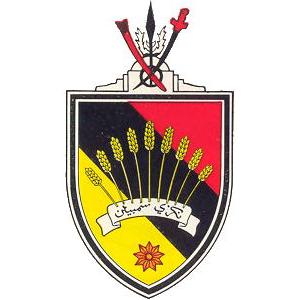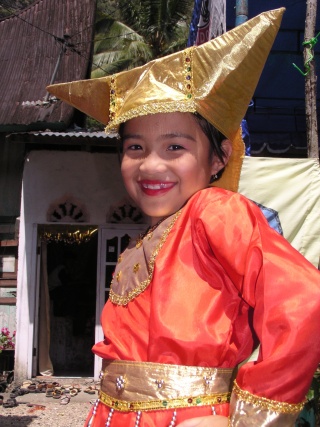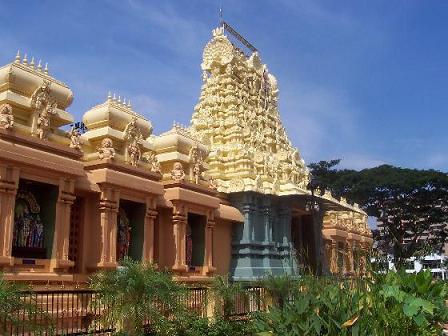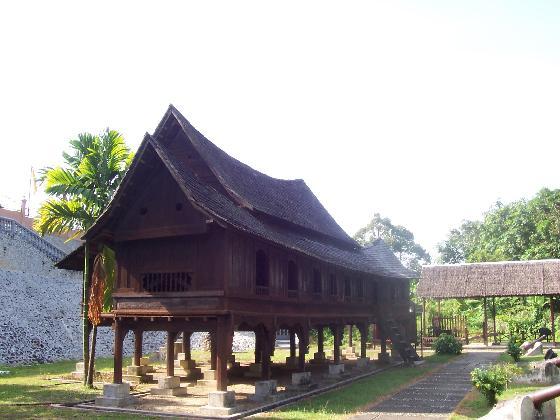Negeri Sembilan
Darul Khusus(The Special Abode)


Negeri Sembilan, located in the central region of Peninsular Malaysia, is bordered in the north by Selangor, in the east by Pahang and in the south by Melaka and Johor. Covering a total area of 6,645 sq km, the land comprises of picturesque valleys and plains amidst undulating hills and mountains. Negeri Sembilan is mainly an agricultural state. However, the establishment of several industrial estates enhanced the manufacturing sector as a major contributor towards the  stateís economy. Agricultural activity includes rubber and oil palm plantations, livestock, fruit orchards and vegetable farming. Manufacturing activity includes electrical and electronics, textiles, furniture, chemicals, machinery, metalwork and rubber products.
stateís economy. Agricultural activity includes rubber and oil palm plantations, livestock, fruit orchards and vegetable farming. Manufacturing activity includes electrical and electronics, textiles, furniture, chemicals, machinery, metalwork and rubber products.
Negeri Sembilan was settled between the 15th and the 16th century by the Minangkabau people who migrated from West Sumatra, Indonesia to the region during the height of the Malay Sultanate in Malacca. One of the unique customs of the Minangkabau is the Adat Perpatih, whereby it follows a matrilineal system of inheritance with property and land passing down from mother to daughter. The Minangkabau of Negeri Sembilan number around half a million and are Muslims of the Malay ethnic group. The other uniqueness of the Minangkabau is the curved roofs of the house. Starting from the middle, it curves upward from the middle and end in points, in imitation of the water buffalo's upward-curving horns. The horn shape can also be seen on the women's traditional costume headdress.

Sights - in the city of Seremban > Go to Malaysia Map for Seremban City Map
The capital of Negeri Sembilan State, few travelers spend time here but if you decide to drop by, there are a few interesting sites. Buffalo-horn roofs adorn many of the new buildings.
Dewan Undangan Negeri The State Secretariat building with the multiple roof points located at central Seremban.
Istana Besar Just opposite the Dewan Undangan Negeri is the home of the Sultan of Negeri Sembilan but is closed to the public. South of the Istana Besar is the State Library, which is Serembanís most imposing colonial building and once the offices of the colonial administration.
 Masjid Negeri In the city center is the Masjid Negeri or state mosque, with its nine pillars symbolising the nine original states of Negeri Sembilan. Located at Jalan Yam Tuan, opposite the Masjid Negeri is the brightly coloured and intricately designed Sri Bala Thandayuthapani Indian temple. This century old temple was built with generous donations from the government, private firms and devotees.
Masjid Negeri In the city center is the Masjid Negeri or state mosque, with its nine pillars symbolising the nine original states of Negeri Sembilan. Located at Jalan Yam Tuan, opposite the Masjid Negeri is the brightly coloured and intricately designed Sri Bala Thandayuthapani Indian temple. This century old temple was built with generous donations from the government, private firms and devotees.
Colonial architecture Other Colonial architecture includes the Catholic Church of Visitation, with its gothic spires, and the Methodist Church, which was built in 1920. The King George V School. (jln Zaíaba) was the premier colonial school for Serembanís elite and still functions as a high school.
Liesheng Temple The old Taoist Liesheng Temple (jln Dr. Samuel) is also an interesting visit.
Lake Gardens The gardens are at the edge of the green and tranquil colonial district that now mostly houses government quarters. To the east of Lake Gardens is a small jungle park or Hutan Rekreasi.
Railway Station The Seremban Railway Station was built in 1918 and completed in 1924 on a three acres of land at a cost of RM26,000, which was a lot of money in those days. The purpose of construction of the railway station was mainly to transport tin to nearby ports as the station is on the North-South route of the railway lines.
Sights - Negeri Sembilanís other attraction
 Muzium NegeriÍ The state museum is built in the style of a Minangkabau Palace and has some worn craft and historical exhibits. It is located inside the Taman Seni Budaya (Arts & Cultural Park. Admission is free). It has a gasing or top spinning pavilion and a small tourist information office. The Istana Ampang Tinggi was originally constructed in the 1860s by the Sultan as a gift to his daughter. A unique feature of this house is it was build without a single nail which enable it to be dismantle and re-assemble again and again. Among other things, this museum houses collections of artefact from the Royal family such as artillery, copper and silver ware. Located here are two other old and traditional Minangkabau houses. The Teratak Perpatih has the Minangkabau unique roof design, mimicking the two pointed ends of a buffalo's horns is typical of Minangkabau traditional house. Inside, you can find local crafts including porcelain, woodcraft and batik. Other exhibits available here inlcude traditional musical instrument and Minangkabau costume. The second house, Negeri Sembilan House was originally built by a Malay prince in 1898 in Air Garam village in Mambau. Referred to as the 'Ghost House' (Rumah Berhantu) by local villagers, the interiors of this mysterious house is furnished with old furnitures.
Muzium NegeriÍ The state museum is built in the style of a Minangkabau Palace and has some worn craft and historical exhibits. It is located inside the Taman Seni Budaya (Arts & Cultural Park. Admission is free). It has a gasing or top spinning pavilion and a small tourist information office. The Istana Ampang Tinggi was originally constructed in the 1860s by the Sultan as a gift to his daughter. A unique feature of this house is it was build without a single nail which enable it to be dismantle and re-assemble again and again. Among other things, this museum houses collections of artefact from the Royal family such as artillery, copper and silver ware. Located here are two other old and traditional Minangkabau houses. The Teratak Perpatih has the Minangkabau unique roof design, mimicking the two pointed ends of a buffalo's horns is typical of Minangkabau traditional house. Inside, you can find local crafts including porcelain, woodcraft and batik. Other exhibits available here inlcude traditional musical instrument and Minangkabau costume. The second house, Negeri Sembilan House was originally built by a Malay prince in 1898 in Air Garam village in Mambau. Referred to as the 'Ghost House' (Rumah Berhantu) by local villagers, the interiors of this mysterious house is furnished with old furnitures.
Getting there
This complex is highly accessible if you're driving there, as it is located just 200m from the Seremban-Labu exit (Interchange 218) of the North-South Expressway. Optionally, you can also take a bus or taxi at the Terminal One bus stand in Seremban town (3km from the bus terminal).
Kuala Pilah & Istana Lama Sri MenantiÍÍ In Kuala Pilah, east from Seremban, the road meanders through the hills to the heartland of Minangkabau culture. Traditional Minangkabau houses, with the buffalo-horn roofs can be found along the main road, as well as villages of Pantai, Terachi and Sri Menanti.
Located 6km off the Seremban-Kuala Pilah road, is the old royal capital Sri Menanti, which was settled by the Minangkabau immigrants from Sumatra. Just past Sri Menantiís own tiny Lake Gardens is Istana Besar, which belongs to the Sultan of Negeri Sembilan.(Not opened to Public). Just beyond Istana Besar is the marvelous Istana Lama (Old Palace), completed in 1905, which is opened to the public. Between 1908 and 1931, this was the royal residence of the Yang DiPertuan Besar Tuanku Muhammad. He occupied the third floor, while the fourth floor was the royal treasury and repository of royal records. This can only be reached by a steep flight of wooden stairs from the royal chamber. The four storey building is built without the use of nails. It is raised off the ground on 99 pillars for each of the legendary 99 luak (clan) warriors. Located in this area is the Royal Mausoleum which houses the grave of Tuanku Abdul Rahman, the first king of Independent Malaysia. Admission is free (10am-6pm).
Port DicksonÍ A stretch of beach extending 16km and dotted with many hotel holiday resorts and apartments. This place is a popular getaway for Malaysians. The beaches are not the best in Malaysia, and the water not as clear as in the East Coast Islands but the seaside location is alluring. Most of the seaside resorts have water sports activities, beach volleyball or just a place to relax by the beach. Interesting sights include Malaysiaís oldest light house, Cape Rachado or Tanjung Tuan lighthouse built by the Portuguese in the 16th century. The turn off to the lighthouse is near the Km16 marker. The small Taoist Fengshan Si temple at Jln Lama and the Sri Maha Mariamman Temple at the back may interest you. For cleaner and clearer water, go to the small Blue Lagoon (Tanjung Biru), with its pretty little beach and assorted marine Life.
Places to Stay
Rotary Sunshine Camp. Tel : 647 3798, Price RM6-8
Kong Ming (Guangming) Hotel. Tel 662 5683, Price RM30-40
Pantai Ria Hotel, Tel :662 5122, Price : RM40-50
Seri Malaysia. Tel : 647 6070, Price RM110-130
Bayu Beach Resort. Tel : 647 3703, Price RM140-160
Regency, Tel : 6474090. Price RM180-250
Avillion Village Resort. One of the nicer resorts, it has attractive and comfortable water chalets built over the sea. www.avillion.com.my. Tel : 647 6688, Price :RM380
Guoman Port Dickson Resort. www.guomanhotels.com. Tel : 662 7878, Price RM320 weekend, RM180 weekday
Corus Paradise Resort. www.corusparadisepd.com, Tel : 647 7600, Price : RM220
Getting there
By Bus : Express buses travel to and from Port Dickson to major towns and cities like KL, Seremban, Ipoh, Melaka and Lumut. The bus and taxi stations are next to each other in the centre of town. From Port Dickson town, local buses will take you to wherever you like along the beach.
Homestays in Negeri Sembilan
Stay in a traditional Malay home instead of a hotel and get a feel of the kampung(village life). Please see homestay link.
homepage > Negeri Sembilan
| 2007 Events
Raptor Watch Week, Tanjung Tuan, Port Dickson
PD International Half Marathon, Port Dickson
Port Dickson Watersports Festival, Port Dickson
E-Puyu Festival, Homestay F-Best, Jempol
Negeri Sembilan Cultural Carnival, Seremban
Mega Sales Shopping Carnival, Throughout Negeri Sembilan
ďPersukuan Adat Perpatih - Raja BerolekĒ Festival, Seri Menanti
Negeri Sembilan Golf Master, Seremban
Seremban Half Marathon, Seremban
Negeri Sembilan 4X4 Challenge, Kuala Pilah, Jempol, Rembau and Port Dickson
PD International Triathlon, Port Dickson
Raja Melewar International Nature Challenge, Port Dickson, Rembau and Kuala Pilah
MATTA FairóNegeri Sembilan Chapter, Seremban
Datuk Climbathon Challenge, Gunung Datuk, Rembau
PD International Bike Fest, Port Dickson
Light & Floral Display Festival, Nilai
World Amateur Golf Inter Team Championship, Seremban
Kenaboi River Challenge, Sungai Kenaboi, Jelebu
World Drum Festival, Port Dickson
National & International Lion Dance Competition, Nilai
Negeri Sembilan Air Carnival, Rembau
Darvin-Bali-Langkawi Yacht Rally, Port Dickson
Port Dickson World Jazz, Rhythm & Blues Fest, Admiral Marina & Leisure Club
Fishing Festival, Seremban
Beach Fishing Championship, Port Dickson
Malaysia Year-End-Sale, Thoughout Negeri Sembilan
|

